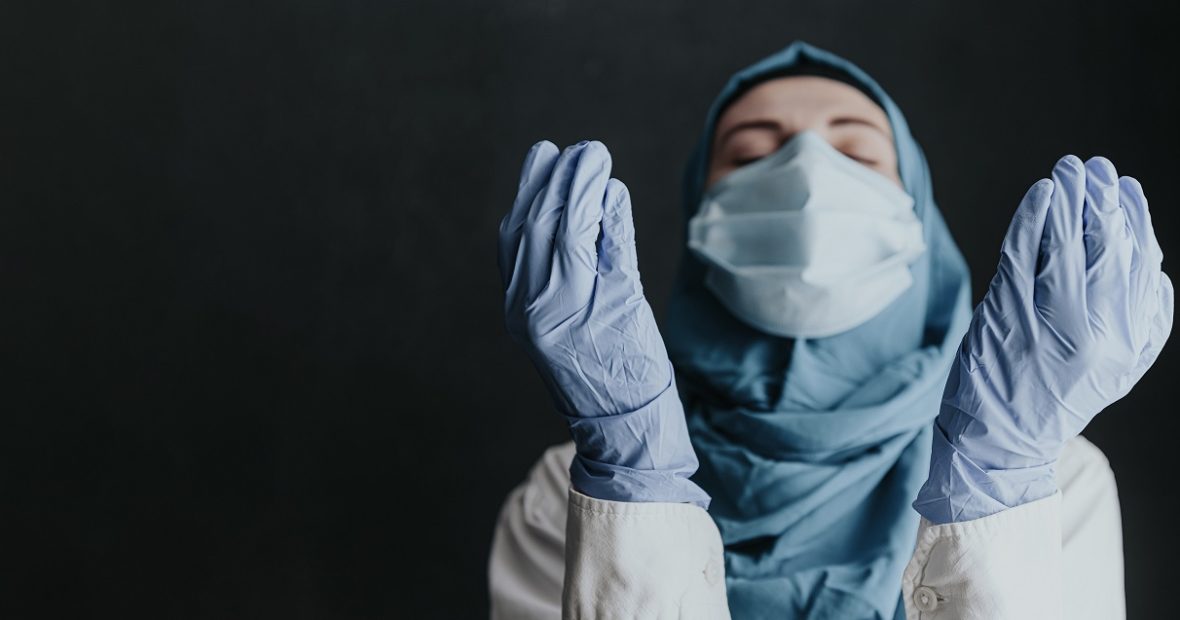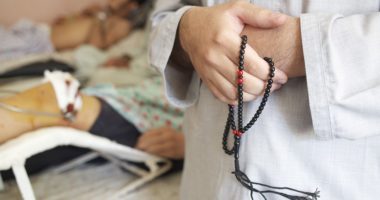Losing a loved one is one of the most difficult things we have to go through in life, even under the best of circumstances. Every culture and community has its own set of rituals to help ease the pain, from Hindus gathering to burn corpses along the Ganges River to the Jewish tradition of receiving condolences at home during a seven-day mourning period.
Under Islamic law, as in many cultures and religions, the management of dead bodies is the object of specific rules that aim at ensuring the dignity and respect of the dead as well as for their living relatives. The nature and sheer scale of the current coronavirus (COVID-19) pandemic, however, has created a number of questions, challenges and even rumours in Muslim-majority states as well as for Muslim communities around the globe.
Humanitarian organizations such as the International Committee of the Red Cross (ICRC) have developed experience and specialized expertise in crisis management and emergency response, medical care in detention, and humanitarian forensics. This experience is accumulated from more than 150 years of operating in conflict zones and from an operational presence in more than 90 countries, positioning the ICRC to provide valuable guidance and assist state authorities and non-state armed groups (NSAGs) in the response to the COVID-19 pandemic.
On the basis of this experience, this article offers expertise on one of the humanitarian challenges caused by the COVID-19 crisis: how Islamic burial laws can be referenced and adapted to the numerous protection challenges in Muslim contexts for a more dignified handling of mortal remains.
Islamic burial laws: protecting life, first and foremost
According to Islamic tradition, the burial of a deceased person is a collective obligation (farḍ kifāyah) by the Muslim community. This obligation consists of ghusl, ritual washing of dead bodies, kafan, or shrouding the body with pieces of cloth and finally salat al-janazah, a funeral prayer.
In handling the remains of COVID-19 victims, whether in Muslim or non-Muslim majority states, Islamic rules developed by Muslim jurists and Islamic authorities must be guided by two considerations:
First, the lives of body handlers and rest of the community must not be endangered. The protection of life (hifẓ al-nafs) is the first of the five ultimate objectives of Islamic law (maqāṣid al-sharīʻah) and therefore overrides any other Islamic obligations. It is therefore of paramount importance to keep in mind, as discussed below, that determining the Islamic position on any of these three Islamic burial laws for the victims of COVID-19 is dependent on the available medical evidence of how such a practice could put a life at risk.
Second, according to Islamic burial rituals, the dignity of the dead and the emotions of their loved ones are to be respected as much as is practically possible in extraordinary situations such as armed conflicts, epidemics, disasters or other catastrophes. This pragmatic approach is characteristic of Islamic law, as evidenced in the Islamic legal maxims[1] pertinent to the COVID-19 pandemic:
- Harm must be removed (al-ḍarar yuzāl);
- Hardship begets ease (Al-mashaqqah tajlib al-taysīr);
- Necessity lifts prohibitions/makes the unlawful lawful (Al-ḍarūrāt tubīḥ al-maḥẓūrāt);
- Necessity is measured according to its proportion (Al-ḍarurah tuqaddar biqadariha); and
- Matters shall be judged by their objectives (Al-umūr bimaqāṣidhā).
Current Islamic burial practices in both Muslim and non-Muslim majority states must be shaped by the available medical evidence and forensic guidelines. However, to date, the medical knowledge and scientific evidence related to the COVID-19 pandemic are incomplete. The guidance provided by Islamic and health authorities in Muslim-majority states and Islamic organizations in the West therefore differ with regard to the three core Islamic burial laws:
Ritual washing (ghusl)
 The required ghusl, or ritual washing of the body, can be performed as normal for COVID-19 victims, provided that the necessary protective measures are put in place. Forensic guidance includes wearing complete Personal Protective Equipment (PPE) – including gloves, gown, a waterproof apron, face shield and goggles, and a mask – as well as avoiding direct contact with blood or bodily fluids, making sure that wounds are covered with waterproof bandages, and avoiding contact with the face and mouth, as well as food, drink, or eating and drinking utensils.
The required ghusl, or ritual washing of the body, can be performed as normal for COVID-19 victims, provided that the necessary protective measures are put in place. Forensic guidance includes wearing complete Personal Protective Equipment (PPE) – including gloves, gown, a waterproof apron, face shield and goggles, and a mask – as well as avoiding direct contact with blood or bodily fluids, making sure that wounds are covered with waterproof bandages, and avoiding contact with the face and mouth, as well as food, drink, or eating and drinking utensils.
To date, ghusl has been administered on the bodies of COVID-19 victims in most cases, as for example in Egypt, the UK or Canada. The most detailed procedural guide on the burial of COVID-19 Muslim victims has been issued by the Canadian Council of Imams and the Muslim Medical Association of Canada. Another guiding manual has just been released by Al-Azhar Global Fatwa Center.
If health authorities conclude that normal ghusl, which includes scrubbing the body of the deceased person, could lead to infection, then merely pouring or just spraying water onto the body is sufficient. This was confirmed by Jordanian Iftaa Board Resolution No. 283, issued on 19 March 2020 and typifying the pragmatic and practical Islamic approach to the issue under discussion. The resolution makes clear that all necessary protective measures must be taken to prevent infection and that as much as possible of the burial rituals shall be performed provided that no infection can be transmitted. Otherwise, merely spraying water on the body and shrouding will suffice.
The Ministry of Health in Morocco has also issued instructions for the handling of dead bodies of confirmed or potential COVID-19 victims, stating that ‘the ritual of washing the body, whether at the hospital morgue or the city morgue, must be supervised by the local management team (reducing to a minimum the use of water, spraying and other rituals used)’. Afterwards, all areas used should be disinfected, including trolleys and tables, and disposable objects should be treated as medical waste.
If spraying water could also lead to infection, then dry purification, or tayammum, should be performed. Both Iran’s Supreme Guide, Ali Khamenei and his eminence Al-Sayyid Ali Al-Husseini Al-Sistani, the prominent Shi‘̄ī authorities, have issued recent fatwas to this effect.
If none of the above is permitted by the health authorities, as is the case for example in Algeria, France and Tunisia, then the body should be buried without ghusl or tayammum. This is not a new Islamic position. In fact, premodern Muslim jurists permitted burials without performing ghusl in cases where the high number of bodies resulting from an epidemic would make it impossible.[2]
Shrouding (kafan)
 Following the same approach as with ghusl, shrouding shall be done only if there is no risk of infection. In his fatwa on 27 March 2020 regarding the burial of those who have died from COVID-19, Ayatollah Al-Sistani proclaimed that the three layers of shroud could wrap the body even from outside the body bag and, if that is not possible, then a single shroud could cover the whole body.
Following the same approach as with ghusl, shrouding shall be done only if there is no risk of infection. In his fatwa on 27 March 2020 regarding the burial of those who have died from COVID-19, Ayatollah Al-Sistani proclaimed that the three layers of shroud could wrap the body even from outside the body bag and, if that is not possible, then a single shroud could cover the whole body.
Funeral prayer (salat al-ghā’ib)
 The funeral prayer requirement should not constitute an issue in the context of COVID-19 because it can be performed by a minimum of two individuals. Furthermore, funeral prayers can be performed at the grave after the burial of the dead. Alternatively, absentee funeral prayers (salat al-ghā’ib) can be performed on COVID-19 victims, as advocated in a recent fatwa issued during a Facebook live session by Sheikh Ahmad Wisam, the Secretary of Fatwa at Dar al-Ifta in Egypt.
The funeral prayer requirement should not constitute an issue in the context of COVID-19 because it can be performed by a minimum of two individuals. Furthermore, funeral prayers can be performed at the grave after the burial of the dead. Alternatively, absentee funeral prayers (salat al-ghā’ib) can be performed on COVID-19 victims, as advocated in a recent fatwa issued during a Facebook live session by Sheikh Ahmad Wisam, the Secretary of Fatwa at Dar al-Ifta in Egypt.
Most Muslim-majority states have closed mosques and advised that funeral prayers should be performed in open spaces or cemeteries. They have also advised keeping the number of those who perform the funeral prayer on the COVID-19 victims to a minimum and ensuring that burial can be carried out on the same day.
Protection challenges
There are several protection challenges in Muslim contexts that the COVID-19 pandemic poses for the humanitarian community. These require a transversal inter- and intra-disciplinary approach.
Denying burial of COVID-19 victims
The refusal to bury the mortal remains of COVID-19 victims is due to the misperception that corpses could spread infection in nearby population centers. These types of rumours led Dr Ahmed al-Tayyeb (the Grand Imam of Al-Azhar, the highest religious authority in the Sunni world) and Dr. Shawki Allam (the Grand Mufti of Egypt) to issue statements condemning and prohibiting this practice.
This illustrates the need for strengthened cooperation between authorities, Islamic institutions and humanitarian organizations – more specifically, humanitarian forensics experts – to ensure a dignified burial of the dead. Dissemination and communication is crucial, both on the relevant scientific evidence as well as the fact that burying the dead as a collective obligation (farḍ kifāyah) in Islam means that the entire Muslim community would be guilty if they failed to fulfil this communal duty.
Collective graves
While Islamic law provides that every dead body should be buried in an individual grave, Muslim jurists agree that, in case of necessity such as armed conflicts or disasters, collective graves are permitted. Male and female bodies should be buried in separate graves, but if necessity dictates otherwise, classical Muslim jurists stipulate that a barrier of dust should be placed between the bodies.
Classical Muslim jurists also agree that Muslims and non-Muslims should be buried in separate graves.[3] However, in situations where the religious identity of bodies is unknown, Muslim jurists have disagreed as to whether they should be buried in Muslim or non-Muslim graves or whether they should be buried in special graves that do not belong to either the Muslim or the non-Muslim graves. This practice of burying the dead in separate graves based on religious identity is still observed in some Muslim-majority states and can hinder the dignified burial of unidentified dead bodies if there are no graves allocated for non-Muslim bodies.
Cremation
In Islamic law and Muslim cultures, burying the dead in the ground is regarded as the correct way of respecting dead bodies, while cremation is prohibited because it is considered a violation of the dignity of the human body.[4] Cremation of the remains of individuals that have died from COVID-19 has therefore been a great concern for Muslim communities in some non-Muslim majority states.
In the UK, the government has amended an emergency COVID-19 bill to stop cremation against the wishes of Muslim and Jewish families, since cremation is strictly prohibited in both faiths. In Sri Lanka, the Muslim community appealed on 26 March 2020 to President Gotabaya Rajapaksa to stop the cremation of COVID-19 Muslim victims. On 3 April 2020, Amnesty International expressed concern that ‘religious tensions could be inflamed if Muslim families not allowed to bury relatives in accordance with religious practice’, noting that two of the early COVID-19 victims belonging to the Muslim faith were ‘forcibly cremated on the instructions of the authorities and against the wishes of the deceased’s families’.
The World Health Organization’s guidance on infection prevention and control for the safe management of bodies in the context of COVID-19 shines a clear light on the debate, stating that ‘To date there is no evidence of persons having become infected from exposure to the bodies of persons who died from COVID-19’. However, a low risk does still exist from the aerosolization of fluids from the body, a risk that is greater for health care and death care workers who may be involved in the examination of a dead body or the cleaning of a mortuary area following autopsy.
Challenges for death care workers and the forensic community
The impacts of the COVID-19 pandemic will be felt by the forensic community for many years to come. Its scale has had a devastating impact on health and death care workers, leaving all involved overwhelmed and desperate for a response to match the strength of the virus and the resulting pandemic. There is a need for greater coordination between those actors involved and for clearer messaging for communities affected.
The ICRC, like many institutions, has worked to develop guidance on COVID-19 for its teams – and for all those working on tackling the pandemic – to help dispel misinformation that has been increasingly filling the gaps of knowledge about the virus and its effects. From the onset of the crisis, we found ourselves confronted with a sea of information and guidance, some aligned and substantiated, some less so. From questions surrounding the level of contagion of the virus from the dead to the living, to what type or level of PPE is required for handling dead bodies, the ICRC finds itself still confronted by much of the same lack of clarity that existed only a month ago.
While there will always be some degree of disagreement within the scientific community, especially at such an early stage when much of the needed research is still ongoing, we must ask ourselves if there is more that could have and still can be done in the coming weeks and months to align globally messaging more coherently between different agencies.
Until then, we can at least agree that there are serious issues regarding a lack of preparedness for emergency planning at national and regional level, and major issues over a lack of adherence to health and safety procedures in many institutions where the dead are managed. These shortcomings have been very much exposed by the current pandemic and beg the question of whether these lessons will be learned for future scenarios.
We also see the role the media, in particular social media, has played in bringing to our attention instances of suspected mismanagement of the dead. The speed at which these stories have hit us has left little time for a full analysis of the validity of claims, reinforcing the need for clear messaging on the risks and the myths surrounding the current outbreak. The ICRC Forensic Unit, in cooperation with other departments internally, has worked to develop key messages targeting decision makers, practitioners, and affected communities themselves. Awareness-raising and coherent messaging can play an important role, in collaboration with other agencies, to reassure concerned communities at a time when they are at their most vulnerable.
For example, clear messaging in social media, as outlined by Islamic law experts, on the Islamic burial laws in the case of COVID-19 is an important example of how such messaging matters. Our experience from dealing with the dead in large-scale disasters has shown how the failure to act and provide quick, coherent messages dispelling common myths can have a serious negative impact on mitigating the risk of panic mass burials and mistreatment of the dead. The impact of these actions on the families of those who have died can be devastating, and only goes to further undermine the dignity of the dead themselves.
We also forget the impact the handling of the dead can have on untrained or unprepared volunteers, drafted in to deal with the dead when the system can no longer cope. The long-term impact on such individuals is something that warrants urgent research.
Finally, we need to remember that we live in a world of amazing diversity and richness of culture and religion. The treatment of the dead in line with these important traditions must not be forgotten. To do otherwise only further undermines their dignity and the needs of the affected community. In the case of Islam, we must seek guidance from those Islamic scholars and religious and community leaders who can best guide us, and work together with them to define a response that speaks to those who this pandemic is affecting. This will help ensure that the response implemented is the one that brings reassurance and comfort to the affected community as a whole, while respecting health and safety concerns.
Conclusion
Islamic burial laws and instructions from health authorities in Muslim-majority states are considerably and continuously shaped by the available medical evidence and forensic guidelines, demonstrating that Islamic law is able to adapt to the reality of handling the remains of people who have died from COVID-19. In other words, it is realistic to follow authorities’ medical and forensic instructions while also respecting Islamic burial laws.
Nonetheless, handling the remains of COVID-19 victims could aggravate this global crisis if adequate coordination between health authorities, humanitarian forensics and Islamic religious authorities does not take place and if guidance on the burial of the COVID-19 Muslim victims is not communicated and explained to the Muslim public through local imams, the media, and community leaders – a scenario that will allow misconceptions and rumours to persist.
In the Islamic legislative process, Muslim jurists use certain Islamic sources and legal tools to develop laws regulating the handling of remains of individuals who have died from COVID-19, guided by the objectives of preventing individual and communal harm and maintaining the dignity of the dead. To fulfil these objectives, humanitarian forensic scientists, protection, communication and networking delegates require basic understanding of the above Islamic positions, the Islamic legal system, its sources and legal tools – coupled with an awareness of the different practices in various Muslim cultures and contexts – that will help them to communicate key messages and facilitate discussions on common ground using a culturally sensitive approach.
[1] On Islamic legal maxims, see for example, Luqman Zakariyah, Legal Maxims in Islamic Criminal Law: Theory and Applications (Brill Nijhoff: Leiden; Boston: 2015).
[2] See ʻAbd Allah ibn Najm al-Khallal, ʻIqd al-Jawāhir al-Thamīnah fī madhhab ʻālim al-Madīnah, ed. Mohammad ʻUthmān, (Beirut: Dār al-Kutub al-ʻIlmiyyah, 2010), pp. 236-237.
[3] Ahmed Al-Dawoody, “Management of the dead from the Islamic law and international humanitarian law perspectives: Considerations for humanitarian forensics,” International Review of the Red Cross, (2017), 99 (2), pp. 769–770.
[4] On the Islamic position on cremation in general and a fatwa by the current Grand Mufti of Egypt on the cremation of the dead bodies of Ebola victims, see Ibid., p. 774.
See also
- Cordula Droege, COVID-19 response in conflict zones hinges on respect for international humanitarian law, April 16, 2020
- Ahmed Al-Dawoody, Respect for the dead under Islamic law: Considerations for humanitarian forensics, November 1, 2018
- Oran Finegan, Dignity in death: Remembrance and the voice of the dead, November 1, 2017







Es impresionante como el CICR es imparcial frente a las costumbres de dichos países, por medio del cual se procura respetar los temas religiosos, y sobreponer la vida de aquellos que brindan el servicio fúnebre, puesto que están expuestos a contagiarse de no seguir los protocolos médicos correspondientes.
¡Excelente publicación!
Muchas gracias Rut!
Dear Prof Ahmed .
Indeed , I benefited a lot from this epistemological and comparative study for many reasons and rationals
1- It is still a challenge for most humanitarian scholars to address various and complicated matters of the pandemic and its repercussions on many arenas and fields .
2- You extensively and thoughtfully supported your arguments with recent concrete and glaring examples such statutes and jurisprudence form both Western and Islamic states that led to enhancing the sound comprehension of your ideas and bases .
3- Safeguarding dead , burying , and respecting them and their families and lovers in Humanitarian International Law is still a rather critical and fundamental subject to be address , it lacks concerns from States and in particular Arab states though .
4- Shedding and illuminating such massive light and concern on this issue incites other researchers and jurists to get along with all debates of the most catch contemporary issue ( Pandemic Corona )
5- You corrected faulted and currently controversial issues : medical concerns with the corpse of the pandemic and indirectly addressing how Islam honors people life regardless , race , ethnicity , nationality , religion or any other affiliations refute sporadic and baseless stigmatization terrorism to Muslims .
Dr Ayman Salama
Posted on behalf of Dr Ahmed Al-Dawoody:
Dear Professor Ayman Salama,
Thank you so much for your comment and your great work in the fields of international law, international humanitarian law and international criminal law. Indeed, safeguarding the dignity of the dead in the context of COVID-19 requires a multidisciplinary approach where the ICRC humanitarian forensic specialists work together with the legal experts, religious and community leaders worldwide.
The article was well research and thought provoking. It broaden my knowledge of managing the dead, also it help my learning of IHL as a humanitarian. Thanks for the knowledge.
Posted on behalf of Dr Ahmed Al-Dawoody:
Thank you so much Mua Zu Dikwa. Further information can be found here.
https://www.cambridge.org/core/journals/international-review-of-the-red-cross/article/management-of-the-dead-from-the-islamic-law-and-international-humanitarian-law-perspectives-considerations-for-humanitarian-forensics/77F3E964A67B2219925B92B02C6F34E9
The so called Muslim laws and customs had been formulated by people in olden days, depending on the situations that prevailed in history. Just as any other man made law can be changed to suit the present day needs, it is left for the Muslim leaders to change laws as applicable to present day needs. That is the role of leaders. If they are to merely follow what had formulated by leaders long time ago, then they are not leaders. If the laws had been enforced by God (Allah), then it is a different story. I do not think Allah had stipulated that the dead should be only buried.
Posted on behalf of Dr Ahmed Al-Dawoody:
Thank you so much Vernon. Yes, most of the Islamic burial laws go back to the 7th century. Throughout history, Muslim jurists have been responding to various challenging situations such as armed conflicts, epidemics, disasters or other catastrophes in order to ensure proper and dignified management of the dead within the limits of what is practically possible. Now, Muslim jurists whether in Muslim majority states or not are working closely with specialized medical experts to ensure dignified burials for people who have died from COVID-19. Obviously, there are variant burial rules and customs in different parts of the Muslim world.
Why was this debate brought up now , why it could not have been discussed before. Has it not happened for over 1000 yrs.
This is the basic fault with GOD related religions . God probably did not expect this , or more possibly the followers ignored it. There are a few faults with GOD ( or ultimate creator) related religions . Man does not seem to have any say in these important matters.
What will happen if one disobey?. What will happen to those who do not believe an ultimate creator.
All present evidence suggest that the Concept of GOD is waning away, more and more( especially young, and those from strict Islamic and Catholic countries) are questioning these beliefs.
From what I see looking at how things are evolving,as someone who has studied current religions irrespective of my birth religion, since my childhood ( I’m nearly 75 yrs. old now)I have a feeling that God or other entity dependent religions( beliefs) will slowly wane away and eventually die away.
Posted on behalf of Dr Ahmed Al-Dawoody:
Thank you so much Dr P Tilak. The discussion of burial of the dead is not a new one. Ancient civilizations, cultures and religions developed their own burial rules. The discussion now focuses on ensuring dignified burials of the dead according to their religions and/or cultures in the context of COVID-19 without posing risks to the life of health care and death care workers or any others involved in the burial ceremonies.
Allah be pleased with you!
Thanks for Share.
Thank you Mawlana Musin Alam!
I believe there is an even more safe way to bury the dead. It has been said that people who died from a pandemic disease are considered ‘martyrs’ or ‘shaheed’. In some school of islamic thinking, a martyr’s body doesn’t have to be washed and should be buried as it is.
Now, I believe, in times of terribly viral disease and pathogens, washing the body of deceased and changing his/her clothes may be skipped. The body can stay in a body bag or encased in a wooden coffin where the body is lying sideward. To me, this seems to be an easier method and practical one too.
Posted on behalf of Dr Ahmed Al-Dawoody:
Thank you so much Yusof. The authorities in some Muslim-majority states have chosen to do that, while others have chosen to do the ritual washing and shrouding under certain conditions based on the instructions of the specialized medical experts.
Myanmar Muslim Covid 19 death body was cremated yesterday and we can only hope that it wont happened to another victims.
Since the covid control systems in Burma has been very mess.
Posted on behalf of Dr Ahmed Al-Dawoody:
International organizations and local authorities have provided guidance that can help ensure proper and dignified management of the dead in the context of COVID-19.
Dear Writer:
Ass Salam U Alaikium.
A good topic and Thanks for your nice write up. Many of the Muslims under different schools of thoughts are striving to get a clear answer on many things. Same here in my community and country.
I am from Bangladesh, where debate over, what is right or wrong under Islam on Covid burial is much debated. As we don’t have any central body, who we will follow, we are unable to receive any concrete and logical answer. So, confusion and contradiction are always crafted and created.
My issue was cremation In case of Covid victim, if-
1. The corpse is totally decomposed, and body fluids are coming out of it due to delay In burial or Due lack of proper preservation system.
2. Limited Burial Space.
3. Due to wet land, chances of underground and surrounding contamination from deceased and diseased person Is high here. Plus the country is going through Huge rainfall and floods after floods this year. We are a riverine country, where a significant people depend on river and open war for drinking water, cooking, bathing, washing things, what not. Can be spread, either through water, or grave unnoticeably dug by animals like dogs and jackals.
4. Zero experienced and poorly protected Pandemic corpse handlers.
Isn’t it, in that case often cremation can be done? Consider the case of conditions of burial at sea.
Will appreciate your reply on this. An email if possible will also be of great help.
May Allah, the Almighty- mercy, protect, safeguard and be with all the human beings in the world.
Thanks and regards.
Mushfiq
Posted on behalf of Dr Ahmed Al-Dawoody:
Dear Mushfiq,
Wa alaykum asalam and many thanks for your comment. The ones who are in best position to answer these questions are the authorities in your country. The health authorities and religious intuitions can provide the best answers that suit each context depending on the medical evidence, the available resources and expertise available.
Thanks again.
Dear professor,
Despite all the facts that you mentioned on your article, there are few countries that neglect the fundamental rights of Islamic religion and forcibly criminate the dead bodies of Muslims specially in sri lanka. I urges all the international bodies to interfere on this matter and make a awareness to the entire world.
Thanks and Regards
Ishraq
If Islam is evolving with time ,cAn you enlighten me on the latest views on these subjects of these subjects please;
If a Muslim having purchased a Plot 30 years ago in a Non denomination Cemetery,requires the Mosque or Local Islamic group,for burial and refuse graveside Prayers in Normal circumstances can this be refused and if so Why? When the Janaza in the mosque is permisible.
What if a muslim has strong views on Land occupation and wishes Cremation,is this acceptable and what are the consequences
Nice posting.Thank you for sharing this post such a useful information.
Thanks for sharing, this is a fantastic post. Great.
You got a nice post. Much obliged.